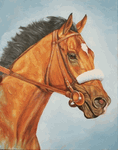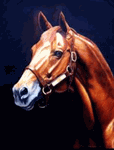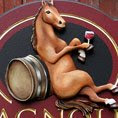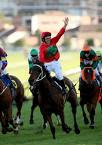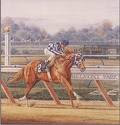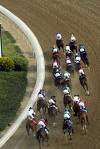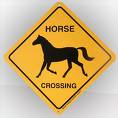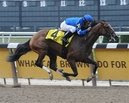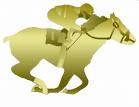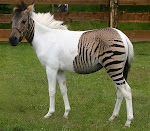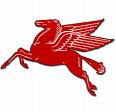“He loved his grandchildren and he loved horses,” said MiChelle Reno, the late jockey’s daughter.
For Pace, who would soon have become a proud grandfather for the eighth time, it was his equine passion that ultimately shortened his life.
The Devine, Texas, resident was killed Sunday when he fell from a horse during a race at Sallisaw’s Blue Ribbon Downs. He was 58.
A short memorial service for Pace will be held at the track before the races Saturday. Reno, of Spokane, Wash., said death might be the only force that could rein in her father, a restless man who was always on the move.
When changes were announced prior to the start of the races, Pace was named to ride a horse that jockey Mike Bishop was originally schedule to ride, 3-year-old filly Reep What You Sow, the No. 2 horse in the race.
As first reported Sunday on tulsaworld.com, during the 5½-furlong race, the filly ran into the rail and Pace fell. An ambulance transported Pace to Sequoyah County Hospital, where he was pronounced dead. The track announcer, Jesse Ullery, said Pace was already dead on the track before being taken to the hospital.
Pace had not ridden in a race at Blue Ribbon Downs this year, according to Blue Ribbon Downs statistics. A second race was run after the incident, but the rest of the races for the day were canceled after news spread of Pace’s death.
“I feel sorry for Mark, it’s a dangerous job,” said Mike Bishop, 46, of Vain whom Pace replaced in Sunday’s event after he was coincidently thrown from his horse on Saturday. “That’s why I pulled off my mount, because my horse broke its leg,” Bishop said. “He (Mark) took my mounts.”
Bishop said, “I had just met Mark, he came out of retirement.”
“I had just met him yesterday,” fellow jockey Cody Smith said of Pace. “I was watching the replay of the race, and it just looked like the horse was a little green and spooked into
Pace, a native Texan, had recently returned to riding after being away for an extended period.
“He showed up just recently at Blue Ribbon Downs,” said retired jockey Rodger Smith, who is Cody Smith’s father. “He didn’t have any tack (riding equipment), and I went and picked up a helmet for him. I met him years ago in Texas when we were both riding down there, and you couldn’t have met a nicer fellow, just an outstanding individual.”
“It’s just a bad deal,” Rodger Smith said. I can remember a couple of jockeys died in the 1980s; one was a 16-year-old (Kevin Lindsey) in a schooling race.”
Lindsey’s horse started bucking out of the gate at Blue Ribbon Downs, and about halfway through the race he was thrown to the track. The horse stepped on Lindsey’s chest, and he did not survive.
According to a four-year study by the Anne Waller of the Department of Emergency Medicine at the University of North Carolina, “for every 1,000 jockeys you have riding, over 600 will have medically treated injuries.” She also told the New York Times that almost 20 percent of those injuries were serious head or neck injuries.
The study showed 6,545 injuries to jockeys from 1993 to 1996. Waller’s report also said that between the years 1950 to 1987, there were more than 100 jockeys who were killed in the United States.
According to the Jockeys’ Guild, which has been keeping track of jockey deaths on the racetrack, more than 140 have lost their lives on the track since 1940.
.





